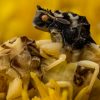In a significant discovery, Colorado Parks and Wildlife officials have identified the first confirmed case of staggering disease in North America, observed in a mountain lion euthanized in Douglas County last year.
Staggering disease, typically fatal and previously documented in European domestic cats, is caused by the rustrela virus, leading affected animals to exhibit symptoms such as difficulty walking, staggering movements, and abnormal behavior. This syndrome has also been observed in various other species including rodents, a donkey, marsupials, and zoo lions, as detailed by CPW.
Reports of the afflicted mountain lion first surfaced from a residential area in Douglas County on May 12, 2023. Upon examination, wildlife officers noted severe mobility issues, prompting euthanasia and subsequent testing. Initial tests for known diseases yielded negative results, prompting further investigation.

Tissue samples were sent to Germany’s Friedrich-Leoffler-Institut, where researchers confirmed the presence of staggering disease, marking a crucial finding for North American wildlife health.
Karen Fox, lead author of the study and a research scientist from Colorado State University and former CPW wildlife pathologist, emphasized the need for continued research to gauge the virus’s prevalence among domestic cats and wildlife in Colorado. She highlighted collaboration with European counterparts to enhance understanding and detection capabilities of staggering diseases within local wildlife populations.
Moving forward, CPW encourages public vigilance and reporting of any sightings of mountain lions displaying abnormal behavior, such as staggering or difficulty walking. This proactive approach aims to facilitate early detection and management efforts, crucial for safeguarding both wildlife and domestic animal populations from the impacts of this emerging neurological syndrome.

